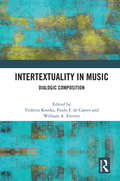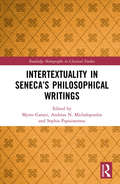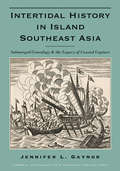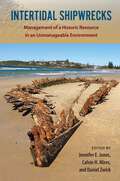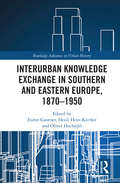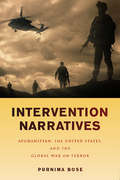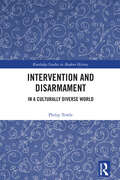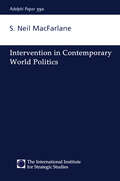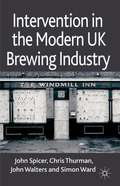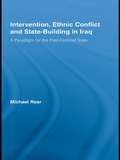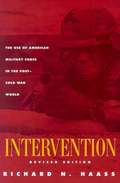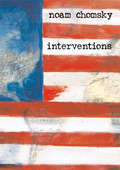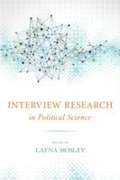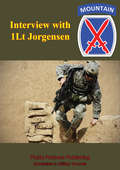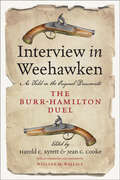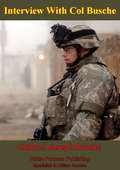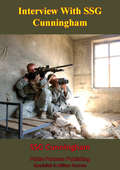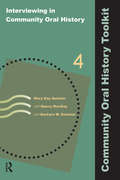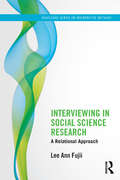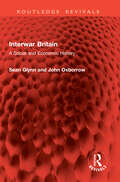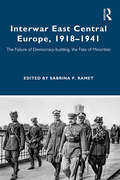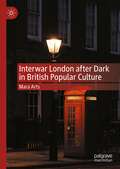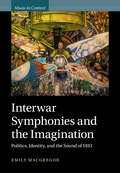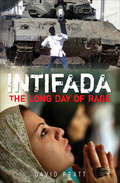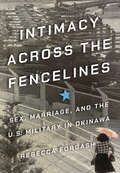- Table View
- List View
Intertextuality in Music: Dialogic Composition
by Violetta KostkaThe concept of intertextuality – namely, the meaning generated by interrelations between different texts – was coined in the 1960s among literary theorists and has been widely applied since then to many other disciplines, including music. Intertextuality in Music: Dialogic Composition provides a systematic investigation of musical intertextuality not only as a general principle of musical creativity but also as a diverse set of devices and techniques that have been consciously developed and applied by many composers in the pursuit of various artistic and aesthetic goals. Intertextual techniques, as this collection reveals, have borne a wide range of results, such as parody, paraphrase, collage and dialogues with and between the past and present. In the age of sampling and remix culture, the very notion of intertextuality seems to have gained increased momentum and visibility, even though the principle of creating new music on the basis of pre-existing music has a long history both inside and outside the Western tradition. The book provides a general survey of musical intertextuality, with a special focus on music from the second half of the twentieth century, but also including examples ranging from the nineteenth century to the second decade of the twenty-first century. The volume is intended to inspire and stimulate new work in intertextual studies in music.
Intertextuality in Seneca’s Philosophical Writings (Routledge Monographs in Classical Studies)
by Garani Myrto Michalopoulos Andreas N. Sophia PapaioannouThis volume is the first systematic study of Seneca’s interaction with earlier literature of a variety of genres and traditions. It examines this interaction and engagement in his prose works, offering interpretative readings that are at once groundbreaking and stimulating to further study. Focusing on the Dialogues, the Naturales quaestiones, and the Moral Epistles, the volume includes multi- perspectival studies of Seneca’s interaction with all the great Latin epics (Lucretius, Vergil and Ovid), and discussions of how Seneca’s philosophical thought is informed by Hellenistic doxography, forensic rhetoric and declamation, the Homeric tradition, Euripidean tragedy and Greco-Roman mythology. The studies analyzes the philosophy behind Seneca’s incorporating exact quotations from earlier tradition (including his criteria of selectivity) and Seneca’s interaction with ideas, trends and techniques from different sources, in order to elucidate his philosophical ideas and underscore his original contribution to the discussion of established philosophical traditions. They also provide a fresh interpretation of moral issues with particular application to the Roman worldview as fashioned by the mos maiorum. The volume, finally, features detailed discussion of the ways in which Seneca, the author of philosophical prose, puts forward his stance towards poetics and figures himself as a poet. Intertextuality in Seneca’s Philosophical Writings will be of interest not only to those working on Seneca’s philosophical works, but also to anyone working on Latin literature and intertextuality in the ancient world.
Intertidal History in Island Southeast Asia: Submerged Genealogy and the Legacy of Coastal Capture
by Jennifer L. GaynorIntertidal History in Island Southeast Asia shows the vital part maritime Southeast Asians played in struggles against domination of the seventeenth-century spice trade by local and European rivals. Looking beyond the narrative of competing mercantile empires, it draws on European and Southeast Asian sources to illustrate Sama sea people's alliances and intermarriage with the sultanate of Makassar and the Bugis realm of Boné. Contrasting with later portrayals of the Sama as stateless pirates and sea gypsies, this history of shifting political and interethnic ties among the people of Sulawesi’s littorals and its land-based realms, along with their shared interests on distant coasts, exemplifies how regional maritime dynamics interacted with social and political worlds above the high-water mark.
Intertidal Shipwrecks: Management of a Historic Resource in an Unmanageable Environment (Society and Ecology in Island and Coastal Archaeology)
by Jennifer E. Jones Calvin H. Mires Daniel ZwickA global array of case studies demonstrating practices for preserving the maritime cultural heritage of vulnerable shipwrecks Shipwreck sites in intertidal zones—the parts of shorelines that are exposed at low tide and covered at high tide—are located within dynamic environments. Periodically uncovered and reburied, these stranded vessels are affected by surf and currents that accelerate the decay of their remains, and their materials are often salvaged. This volume presents 17 case studies from 9 countries on the management of intertidal shipwrecks and strategies for conservation, archaeological research, and public outreach focused on such sites.These case studies explore topics such as legislation protecting shipwrecks along the Pacific coast of New Zealand, the ways wreck sites in Germany’s North Sea coastline are safeguarded and studied, local community participation in the preservation of shipwrecks along the Patagonian Atlantic coast, and the effects of climate change on sites along the Potomac River in Maryland. Pioneering intertidal resource managers discuss innovative strategies for preventing damage to ships and losses to local maritime heritage. The first volume to examine these sites at varying scales across the globe, Intertidal Shipwrecks is an important resource as climate impacts increase and the role of citizen science programs becomes more significant. A volume in the series Society and Ecology in Island and Coastal Archaeology, edited by Victor D. Thompson and Scott M. FitzpatrickContributors: Edward Pollard | Jose Manuel Mates Luque | Bev Parslow | Susan B.M. Langley | Karl Brady | Monica Grosso | Linda Shine | Hefin Meara | Guillermo Gutiérrez | Christian Murray | James P. Delgado | Mark Harrison | Anthony Corn | Sandra Henry | Athena Trakadas | Nathan Richards | Carlo Beltrame | Maria Paula Bunicontro | Stephen B. Atkinson | Kurt Bennett | Stefan Claesson | Brad Duncan | Taylor Picard | Andy Sherman | Amy A. Borgens | Chuck Meide | Mariam Pousa
Interurban Knowledge Exchange in Southern and Eastern Europe, 1870–1950 (Routledge Advances in Urban History)
by Heidi Hein-Kircher Oliver Hochadel Eszter GantnerAround 1900 cities in Southern and Eastern Europe were persistently labeled "backward" and "delayed." Allegedly, they had no alternative but to follow the role model of the metropolises, of London, Paris or Vienna. This edited volume fundamentally questions this assumption. It shows that cities as diverse as Barcelona, Berdyansk, Budapest, Lviv, Milan, Moscow, Prague, Warsaw and Zagreb pursued their own agendas of modernization. In order to solve their pressing problems with respect to urban planning and public health, they searched for best practices abroad. The solutions they gleaned from other cities were eclectic to fit the specific needs of a given urban space and were thus often innovative. This applied urban knowledge was generated through interurban networks and multi-directional exchanges. Yet in the period around 1900, this transnational municipalism often clashed with the forging of urban and national identities, highlighting the tensions between the universal and the local. This interurban perspective helps to overcome nationalist perspectives in historiography as well as outdated notions of "center and periphery." This volume will appeal to scholars from a large number of disciplines, including urban historians, historians of Eastern and Southern Europe, historians of science and medicine, and scholars interested in transnational connections.
Intervention Narratives: Afghanistan, the United States, and the Global War on Terror (War Culture)
by Purnima BoseIntervention Narratives examines the contradictory cultural representations of the US intervention in Afghanistan that help to justify an imperial foreign policy. These narratives involve projecting Afghans as brave anti-communist warriors who suffered the consequences of American disengagement with the region following the end of the Cold War, as victimized women who can be empowered through enterprise, as innocent dogs who need to be saved by US soldiers, and as terrorists who deserve punishment for 9/11. Given that much of public political life now involves affect rather than knowledge, feelings rather than facts, familiar recurring tropes of heroism, terrorism, entrepreneurship, and canine love make the war easier to comprehend and elicit sympathy for US military forces. An indictment of US policy, Bose demonstrates that contemporary imperialism operates on an ideologically diverse cultural terrain to enlist support for the war across the political spectrum.
Intervention and Disarmament: In a Culturally Diverse World (Routledge Studies in Modern History)
by Philip TowleIn this book, some of Philip Towle’s major contributions are brought together to shed light on the Cold War and its aftermath. Topics include the build-up of chemical and nuclear weapons, the attack on New York’s World Trade Center in 2001, intervention in overseas conflicts, and the role of the Church. The first section concentrates on the ways in which the West has interfered in conflicts around the world from the Vietnam War to Bosnia, Afghanistan, and Iraq, and explains why intervention worked in former Yugoslavia but not in countries such as Vietnam, Afghanistan, or Libya. The second section focuses on arms control and disarmament, how they were linked to intervention – particularly through the fear of terrorism – and how and why some arms control measures succeeded, and some did not. Intervention and Disarmament: In a Culturally Diverse World is useful for postgraduates and scholars interested in international affairs and warfare in the modern world.
Intervention in Contemporary World Politics: Intervention In Contemporary World Politics (Adelphi series)
by Neil MacfarlaneExamines multilateral interventions in civil conflicts and the evolution of the role of such interventions in world politics. It focuses primarily on the Cold War and post-Cold War eras and the differences between them. It contests the notion that there is an emerging norm of humanitarian intervention in international politics, arguing that political interests remain essential to the practice of intervention.
Intervention in the Modern UK Brewing Industry
by Chris Thurman John Spicer John Walters Simon WardThis is the story of the radical intervention carried out by the Thatcher administration in response to 1986-89 Monopolies and Mergers Commission inquiry into brewing. It describes the creation of big brewers, the official investigations into what many saw as an uncompetitive structure and the damaging consequences for consumers and licensees.
Intervention, Ethnic Conflict and State-Building in Iraq: A Paradigm for the Post-Colonial State (Studies in International Relations)
by Michael RearExternal intervention by the U.N. and other actors in ethnic conflicts has interfered with the state-building process in post-colonial states. Rear examines the 1991 uprisings in Iraq and demonstrates how this intervention has contributed to the problems with democratization experienced in the post-Saddam era. This timely work will appeal to scholars of International Relations and Middle East studies, as well as those seeking greater insight into the current conflict in Iraq.
Intervention: The Use of American Military Force in the Post-Cold War World
by Richard N. HaassFirst published in 1994, this volume addresses the debate over US intervention around the world, including recent cases, the politics of force, learning from history, the future of intervention. An afterword addresses the use of force by the US since 1994. Appendices present relevant documents and remarks by such figures as Caspar Weinberger, Colin Powell, and Bill Clinton.
Interventions
by Noam ChomskyInterventions by Noam Chomsky is getting new press after the Pentagon banned the book from Guantanamo Bay's prison library. The Miami Herald broke the story on October 11, 2009 and stories followed in The Washington Independent, the Boston Herald, and other outlets. Democracy Now! picked up the story on October 13: "Published in 2007, Interventions compiles a series of Chomsky's columns. The Pentagon has refused to explain why the book has been barred.""Chomsky is a global phenomenon . . . perhaps the most widely read voice on foreign policy on the planet."--The New York Times Book ReviewInterventions is Noam Chomsky at his best.Not since his all-time best-selling title, 9/11, published in the Open Media series in 2001, have readers had a timely, short, easy-to-read, affordable Chomsky. Unlike 9/11, Interventions is a writerly work--a series of more than thirty tightly argued essays aimed at various aspects of US power and politics in the post-9/11 world. While critical of US military interventions around the globe, each piece in the book is in itself an intellectual intervention aimed at raising public ire about the consequences of US use of power at home and abroad.Interventions' subjects span from 9/11 and the Iraq war to Social Security and Intelligent Design, South America and Asia, the Israeli occupation of Palestine and the election of Hamas, Hurricane Katrina, and the US concept of "just war."According to BusinessWeek, "With relentless logic, Chomsky bids us to listen closely to what our leaders tell us--and to discern what they are leaving out. . . . Agree with him or not, we lose out by not listening." Chomsky's Interventions delivers what readers want: an accessible set of skeleton keys for opening up a wide range of global issues dominating today's political landscape.Noam Chomsky is the critically acclaimed author of many books, including Hegemony or Survival, Imperial Ambitions, Failed States, Manufacturing Consent, and Media Control.
Interview Research In Political Science
by Layna MosleyInterviews are a frequent and important part of empirical research in political science, but graduate programs rarely offer discipline-specific training in selecting interviewees, conducting interviews, and using the data thus collected. Interview Research in Political Science addresses this vital need, offering hard-won advice for both graduate students and faculty members. The contributors to this book have worked in a variety of field locations and settings and have interviewed a wide array of informants, from government officials to members of rebel movements and victims of wartime violence, from lobbyists and corporate executives to workers and trade unionists. The authors encourage scholars from all subfields of political science to use interviews in their research, and they provide a set of lessons and tools for doing so. The book addresses how to construct a sample of interviewees; how to collect and report interview data; and how to address ethical considerations and the Institutional Review Board process. Other chapters discuss how to link interview-based evidence with causal claims; how to use proxy interviews or an interpreter to improve access; and how to structure interview questions. A useful appendix contains examples of consent documents, semistructured interview prompts, and interview protocols. Contributors: Frank R. Baumgartner, The University of North Carolina at Chapel Hill; Matthew N. Beckmann, University of California, Irvine; Jeffrey M. Berry, Tufts University; Erik Bleich, Middlebury College; Sarah M. Brooks, The Ohio State University; Melani Cammett, Brown University; Lee Ann Fujii, University of Toronto; Mary Gallagher, University of Michigan; Richard L. Hall, University of Michigan; Marie Hojnacki, Pennsylvania State University; David C. Kimball, University of Missouri, St. Louis; Beth L. Leech, Rutgers, the State University of New Jersey; Julia F. Lynch, University of Pennsylvania; Cathie Jo Martin, Boston University; Lauren Maclean, Indiana University; Layna Mosley, The University of North Carolina at Chapel Hill; Robert Pekkanen, University of Washington; William Reno, Northwestern University; Reuel R. Rogers, Northwestern University
Interview With 1LT Jorgensen (Eyewitness To Modern War #10)
by Douglas CubbisonDouglas Cubbison, the Command Historian for the 10th Mountain Division, conducted a series of interviews with the soldiers of the 10th Mountain Division in Afghanistan during January 2007, along with several additional interviews conducted in February 2007 at Fort Drum, New York. The interviews are fairly wide ranging in the topics covered but all center around one particularly memorable event for the soldier being interviewed, such as an ambush, a patrol, a firefight, a helicopter crash, or a hero ceremony. This transcript is from the interview with First Lieutenant Jorgensen, Bravo Troop, 3rd Squadron, 71st Cavalry, conducted on 22 January 2007 at Forward Operating Base Naray, Afghanistan.
Interview in Weehawken: The Burr-Hamilton Duel as Told in the Original Documents
by Harold C. Syrett Jean G. Cooke Willard M. WallaceThe Broadway sensation Hamilton has sparked renewed interest in the historical figures of Alexander Hamilton and Aaron Burr. This closely annotated thread of documents provides a riveting account of the lead-up to and aftermath of their disastrous duel. From the summer of 1804, we have the fiery correspondence between Hamilton and Burr, notes and accounts from their seconds-in-command, and other documents that provide an immediate sense of the personalities and times. The introduction and conclusion provide a concise and informative perspective on the parallel lives of Hamilton and Burr and of the duel’s lasting impacts on American history. This is the perfect summary of the events that inspired the hit musical—a great resource for teachers and students and the perfect gift for history buffs.
Interview with Col. Joseph Buche - 101st Airborne Division (Eyewitness To Modern War #8)
by Dr Tom BruscinoHaving assumed command of 3rd Battalion, 187th Infantry Regiment, 101st Airborne Division on D-Day, 6 June 2003, Colonel Joseph Buche initially deployed around the Tall Afar border region before his unit redeployed on short notice to the Al Qaim area where it played a central role in the success of Operation Rifles Blitz...Alerted that 3-187 should be prepared for operations in Najaf or Karbala then Fallujah, the operation in and around the Iraqi-Syrian border town of Al Qaim came as a surprise. "It came out of the blue" said Buche. "I'd never heard of Husaybah or Al Qaim, Iraq." Iron Hammer - 3-187's piece of Rifles Blitz - proved challenging, including the move into a new area of operations and the inherent tensions between the missions assigned...He emphasized several factors which contributed to the success of Rifles Blitz, including the reliability of their interpreters, the integration of psychological operations and information operations into the unit's scheme of maneuver, the ability to mass a lot of soldiers on the ground, the capability of trusted staff officers, and the matching of unit missions with the personalities of unit commanders. The need to establish a position of strength visible to the Iraqi people, he insists, is an imperative for successfully dealing with the populace..."Part of what I wanted to do" Buche added, "was to let any bad guys know that hell was coming to breakfast." Looking back, he proudly boasts that the operation was so successful that the enemy simply failed to fight. "I didn't have a hard time with not having any firefights in that operation at all. I took pride in it because, to me, that was evidence that those company commanders and troopers out there had maneuvered so well that the enemy never found themselves in a position of advantage where they wanted to engage us."
Interview with SSG Cunningham - 10th Mountain Division (Eyewitness To Modern War #7)
by Douglas CubbisonA US Army master sniper in charge of a team of marksmen and forward observers of the 10th Mountain Division recounts his experiences of Afghanistan during Operation Enduring Freedom.
Interviewing in Community Oral History (Community Oral History Toolkit #4)
by Nancy MacKay Barbara W Sommer Mary Kay QuinlanThe interview is the anchor of an oral history project. The fourth book in the five-volume Community Oral History Toolkit guides the interviewer through all the steps from interview preparation through follow-up. It includes guidance on selecting interviewees, training interviewers, using recording equipment, and ethical issues concerning the interviewer-interviewee relationship. Packed with instructive case studies, Volume 4 offers concrete practical examples and advice for issues such as pre-interview research, developing interview questions and points for guiding discussion, ideal interview settings and conditions, strategies for stimulating interviewees’ memories, acceptable communication techniques and behavior throughout the interview process, and rounding out interview documentation with supplementary materials and contextual information.
Interviewing in Social Science Research: A Relational Approach (Routledge Series on Interpretive Methods)
by Lee Ann FujiiWhat is interviewing and when is this method useful? What does it mean to select rather than sample interviewees? Once the researcher has found people to interview, how does she build a working relationship with her interviewees? What should the dynamics of talking and listening in interviews be? How do researchers begin to analyze the narrative data generated through interviews? Lee Ann Fujii explores the answers to these inquiries in Interviewing in Social Science Research, the latest entry in the Routledge Series on Interpretive Methods. This short, highly readable book explores an interpretive approach to interviewing for purposes of social science research. Using an interpretive methodology, the book examines interviewing as a relational enterprise. As a relational undertaking, interviewing is more akin to a two-way dialogue than a one-way interrogation. Fujii examines the methodological foundations for a relational approach to interviewing, while at the same time covering many of the practical nuts and bolts of relational interviewing. Examples come from the author’s experiences conducting interviews in Bosnia, Rwanda, and the United States, and from relevant literatures across a variety of social scientific disciplines. Appendices to the book contain specific tips and suggestions for relational interviewing in addition to interview excerpts that give readers a sense of how relational interviews unfold. This book will be of great value to graduate students and researchers from across the social sciences who are considering or planning to use interviews in their research, and can be easily used by academics for teaching courses or workshops in social science methods.
Interwar Britain: A Social and Economic History (Routledge Revivals)
by Sean Glynn John OxborrowFirst published in 1976, Interwar Britain presents a highly readable and up-to-date account of a crucial period in modern British history. The major economic and social issues, ranging from economic growth and policy to social welfare and housing, are examined in detail, and full account is taken both of recent research and of the important areas of ignorance.The emphasis, however, is upon interpretation and analysis rather than detail, and a new and illuminating approach is presented in dealing with many of the leading problems of the period, particularly unemployment and labour relations.The book will be of major interest to students of economic history, social policy, and to all concerned to know more about the economic and social influences which have shaped modern Britain.
Interwar East Central Europe, 1918-1941: The Failure of Democracy-building, the Fate of Minorities (Routledge Studies in Modern European History)
by Sabrina P. RametThis monograph focuses on the challenges that interwar regimes faced and how they coped with them in the aftermath of World War One, focusing especially on the failure to establish and stabilize democratic regimes, as well as on the fate of ethnic and religious minorities. Topics explored include the political systems and how they changed during the two decades under review, land reform, Church–state relations, and culture. Countries studied include Poland, Czechoslovakia, Hungary, Yugoslavia, Romania, Bulgaria, and Albania.
Interwar London after Dark in British Popular Culture
by Mara ArtsThis book explores the representation of London’s nightlife in popular films and newspapers of the interwar period. Through a series of case-studies, it analyses how British popular media in the 1920s and 1930s displayed the capital after dark. It argues that newspapers and films were part of a common culture, which capitalized on the transgressive possibilities of the night. At the same time both media ensured that those in authority, such as the police, were always shown to ultimately be in control of the night. The first chapter of the book provides an overview of the British film and newspaper industries in the interwar period. Subsequent chapters each explore a specific aspect of London’s nightlife. In turn, these chapters consider how films and newspapers of the interwar period depicted women navigating the street at night; the Metropolitan Police’s involvement in nightlife; and the capital’s newly built and expanded suburbs and public transport network. Finally, the book considers how newspapers and films depicted themselves and one another.
Interwar Symphonies and the Imagination: Politics, Identity, and the Sound of 1933 (Music in Context)
by Emily MacGregorThe symphony has long been entangled with ideas of self and value. Though standard historical accounts suggest that composers' interest in the symphony was almost extinguished in the early 1930s, this book makes plain the genre's continued cultural dominance, and argues that the symphony can illuminate issues around space/geography, race, and postcolonialism in Germany, France, Mexico, and the United States. Focusing on a number of symphonies composed or premiered in 1933, this book recreates some of the cultural and political landscapes of an uncertain historical moment-a year when Hitler took power in Germany, and the Great Depression reached its peak in the United States. Interwar Symphonies and the Imagination asks what North American and European symphonies from the early 1930s can tell us about how people imagined selfhood during a period of international insecurity and political upheaval, of expansionist and colonial fantasies, scientised racism, and emergent fascism.
Intifada: Palestine and Israel - The Long Day of Rage
by David PrattArmed with stones, Kalashnikovs, and the scarcely believable martyrdom of the suicide bomber, a generation of Palestinians has confronted one of the most lethal armies in the Middle East in a battle that has stunned and horrified the world. For almost two decades the Intifada has been the byword for Palestinian resistance to Israeli occupation. But, for all its familiar usage in the media, many people remain unclear as to what the Intifada really is, or how it began. Just what fuels the anger? Who are the key players in this deadly clash and where, during these dangerous days in the Middle East, does the resistance go from here? Part reflection, part reportage, in The Long Day Of Rage award-winning foreign correspondent and film-maker David Pratt, takes the reader on a journey across the frontlines of the Palestinian uprising.From the War of the Stones in the 1980s, to the eruption of the al-Aqsa Intifada in 2000, and the ultimate rise of Hamas, this is an eyewitness tour through the Islamic hotbeds, beleaguered refugee camps, and bomb-makers’ dens of the West Bank and Gaza Strip. Above all, it is a gripping and graphic account of a people's struggle to shake off oppression as viewed from the ground zero of besieged Ramallah and the ruins of a shell-shattered Jenin.About the author:David Pratt has been a foreign correspondent and photojournalist specialising in the Middle East, Arab and Islamic world for more than twenty years. He has worked for Reuters, the Institute for War and Peace Reporting (IWPR), and is a regular contributor to the BBC on conflict and foreign affairs issues. During an adventurous career, Pratt has covered wars across the Middle East and Africa, including Israel/Palestine, Iraq, Congo, Sudan and Somalia, and has twice been a finalist in the Amnesty International Media Awards for his reporting on human rights issues. In Afghanistan in 1989 he had the dubious pleasure of having tea and a chat with Osama bin Laden during a lull in fighting around the city of Jalalabad. David Pratt is currently the Foreign Editor of the Sunday Herald.
Intimacy across the Fencelines: Sex, Marriage, and the U.S. Military in Okinawa
by Rebecca ForgashIntimacy Across the Fencelines examines intimacy in the form of sexual encounters, dating, marriage, and family that involve US service members and local residents. Rebecca Forgash analyzes the stories of individual US service members and their Okinawan spouses and family members against the backdrop of Okinawan history, political and economic entanglements with Japan and the United States, and a longstanding anti-base movement. The narratives highlight the simultaneously repressive and creative power of military "fencelines," sites of symbolic negotiation and struggle involving gender, race, and class that divide the social landscape in communities that host US bases.Intimacy Across the Fencelines anchors the global US military complex and US-Japan security alliance in intimate everyday experiences and emotions, illuminating important aspects of the lived experiences of war and imperialism.
